 |
making sense of the news one week at a time |
A Short History of White Racism in the Two-Party System
¯¯¯¯¯¯¯¯¯¯¯¯¯¯¯¯¯¯¯¯¯¯¯¯¯¯¯¯¯¯¯¯¯¯¯¯¯¯¯¯¯¯¯¯¯¯¯¯¯¯¯¯¯¯
If you’ve seen the Lincoln movie, maybe you’re still walking around with this bit of cognitive dissonance[….]
The story is doubly worth telling because Republicans like Ann Coulter and Jonah Goldberg have been misrepresenting it so grossly.
A good place to start is the presidential election of 1860, which brings Lincoln to power and convinces Southern whites (the only people who can vote in the South in 1860) that secession is their best chance to maintain slavery*.
Lincoln gets only 40% of the vote, but in a four-way race (the Democratic Convention split over whether the platform should endorse the Supreme Court’s Dred Scott decision) that’s enough to win. In terms of the popular vote, his closest competition is Illinois Democrat Stephen Douglas (30%), but in electoral votes another Democrat, sitting Vice President John Breckenridge of Kentucky, finishes second with 72 EVs to Lincoln’s 180.
Douglas fails because he is a national candidate representing continued compromise over slavery, while Breckenridge and Lincoln are sectional candidates with clear pro- and anti-slavery positions. So Douglas gets 15% in Alabama (to Lincoln’s 0%) and 43% in Wisconsin (to Breckenridge’s 0.5%), but only manages to carry Missouri and New Jersey, giving him 12 EVs and fourth place behind John Bell’s 39.
During Reconstruction, Southern whites still blame Lincoln’s party for their humiliation in “the War of Northern Aggression“, but the new black vote makes Southern Republicans competitive — particularly in South Carolina, where blacks have long outnumbered whites. So the 1876 map looks like this:

1876 electoral map
But by 1896 the Jim Crow laws have disenfranchised Southern blacks, and Southern whites still remember how Lincoln destroyed their society, so Southern Republicans go extinct. Mississippi, for example, gives Democrat William Jennings Bryan a 91% majority. The 1896 map is almost a negative of the 2012 map — Democratic in the South and Mountain West, Republican in the Northeast, Midwest, and Far West.

1896 electoral map
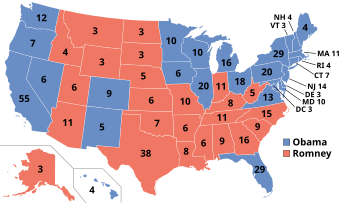
2012 electoral map
The “solid South” stays Democratic through 1944, when FDR carries Mississippi with 94% of the vote.
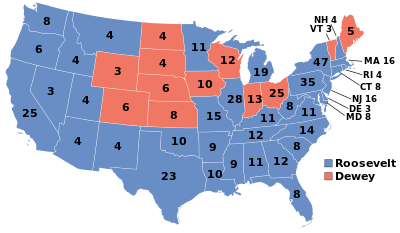
1944 electoral map
So until 1944, there is no doubt that the Democrats are the party of Jim Crow. National figures like FDR may not be actively racist — and blacks benefit from the general anti-poverty provisions of the New Deal — but Democrats are not going to rock the boat of Southern white supremacy. Republicans, on the other hand, have nothing to defend in the old Confederacy, so it costs them nothing to champion civil rights. Their 1944 platform does them credit:
Racial and Religious Intolerance
We unreservedly condemn the injection into American life of appeals to racial or religious prejudice.
We pledge an immediate Congressional inquiry to ascertain the extent to which mistreatment, segregation and discrimination against Negroes who are in our armed forces are impairing morale and efficiency, and the adoption of corrective legislation.
We pledge the establishment by Federal legislation of a permanent Fair Employment Practice Commission.
Anti-Poll Tax
The payment of any poll tax should not be a condition of voting in Federal elections and we favor immediate submission of a Constitutional amendment for its abolition.
Anti-Lynching
We favor legislation against lynching and pledge our sincere efforts in behalf of its early enactment.
But outside the South, Democrats are also changing. In 1941 Roosevelt bans racial discrimination in defense industries.
At the 1948 Democratic Convention, a young Hubert Humphrey leads a Northern liberal bloc that adds this Civil Rights plank to the platform:
We again state our belief that racial and religious minorities must have the right to live, the right to work, the right to vote, the full and equal protection of the laws, on a basis of equality with all citizens as guaranteed by the Constitution.
We highly commend President Harry S. Truman for his courageous stand on the issue of civil rights.
We call upon the Congress to support our President in guaranteeing these basic and fundamental American Principles:
(1) the right of full and equal political participation;
(2) the right to equal opportunity of employment;
(3) the right of security of person;
(4) and the right of equal treatment in the service and defense of our nation.
Southern delegates respond by walking out of the convention and establishing the States’ Rights Democratic Party, a.k.a. the Dixiecrats, who nominate South Carolina’s Democratic Governor Strom Thurmond for president and endorse “the segregation of the races and the racial integrity of each race”. In spite of later efforts to sugarcoat his memory, Thurmond is a racist running an openly racist campaign. He tells one rally:
There’s not enough troops in the army to force the Southern people to break down segregation and admit the nigger** race into our theaters, into our swimming pools, into our homes, and into our churches.
After the Dixiecrat walkout, President Truman decides the die is cast and desegregates the military.
The 1948 electoral map looks like this:

1948 electoral map
So Democrats and Dixiecrats split the South, with still no Southern Republicans worth mentioning. Tom Dewey gets only 3% of the vote in Mississippi and 4% in South Carolina.
1948-1980 is a transitional period. On the state level, the South is still solidly Democratic. Republicans often don’t even bother to field candidates, as in Alabama in 1962, where George Wallace wins the governor’s race with 96% of the vote. (Wallace previously ran in 1958 with the endorsement of the NAACP and without support from the KKK. After losing the Democratic primary to a more openly racist candidate, he said, “I was out-niggered by John Patterson. And I’ll tell you here and now, I will never be out-niggered again.”)
The great civil rights face-offs of the 50s and 60s are between Southern Democratic governors and presidents of either party. In 1957, Republican President Dwight Eisenhower sends troops to Little Rock when Democratic Governor Orval Faubus refuses to integrate Central High School. But Democratic President John Kennedy does exactly the same thing in 1962 when Democratic Governor Ross Barnett refuses to integrate the University of Mississippi, and in 1963 when Governor Wallace refuses to integrate the University of Alabama.
With Eisenhower’s invasion of Little Rock still rankling, 1960 is the second-to-last hurrah of the Democratic South. Putting Texan Lyndon Johnson on the ticket holds most of the South for Kennedy, but the Democrats’ hold is slipping: 15 Southern electoral votes go to Virginia Senator Harry Byrd, and Nixon is competitive in places Republicans never were before; he gets 49% in South Carolina, far more than Dewey’s 4% just three elections ago.
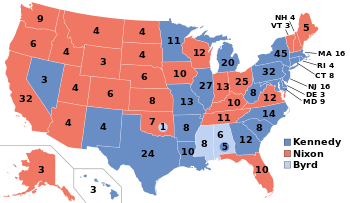
1960 electoral map
After JFK’s assassination, Johnson pushes the Civil Rights Act of 1964 through Congress with bipartisan support. 18 Southern Democrats and one Republican filibuster in the Senate — a rare occurrence in those days — but the bill ultimately passes with 46 Democratic votes and 27 Republicans. As he signs the bill, Johnson comments, “We have lost the South for a generation.“
But will the Republicans pick the South up, or will spurned Dixiecrats be a regional party whose support no one wants? Through the 60s, moderate Republicans like Nelson Rockefeller and George Romney push to uphold the Lincoln-Dewey-Eisenhower civil-rights tradition and compete for black votes. But they lose. The 1964 Republican nominee against Johnson is Barry Goldwater, one of the few non-Southern senators who voted against the Civil Right Act.
Goldwater marks the beginning of I’m-not-a-racist-but Republicanism. His stated reasons for opposing the Civil Right bill have nothing to do with race. (He thought it was unconstitutional.) And the 1964 Republican platform stands by the Party’s pro-civil-rights record:
[W]e pledge: …
—full implementation and faithful execution of the Civil Rights Act of 1964, and all other civil rights statutes, to assure equal rights and opportunities guaranteed by the Constitution to every citizen;
—improvements of civil rights statutes adequate to changing needs of our times;
—such additional administrative or legislative actions as may be required to end the denial, for whatever unlawful reason, of the right to vote;
—immigration legislation seeking to re-unite families and continuation of the “Fair Share” Refugee Program;
—continued opposition to discrimination based on race, creed, national origin or sex. We recognize that the elimination of any such discrimination is a matter of heart, conscience, and education, as well as of equal rights under law.
But it also gives white racists reason to hope.
[The Johnson] Administration has failed to apply Republican-initiated retraining programs where most needed particularly where they could afford new economic opportunities to Negro citizens. It has preferred, instead, divisive political proposals.
i.e. the Civil Rights Act and what becomes the Voting Rights Act of 1965. The platform also denounces ”inverse discrimination” and “the abandonment of neighborhood schools, for reasons of race”. So Goldwater is against a public school saying “no niggers”, but if a neighborhood (just by pure chance, of course) happens to be all-white, its all-white school is just fine. His party also pledges
to open avenues of peaceful progress in solving racial controversies while discouraging lawlessness and violence.
Note the change: Dewey was worried about lynchings — white-on-black violence. In 1964 lynching are still happening, the Watts riots are still in the future, and Martin Luther King’s campaign of non-violent civil disobedience is being met with murders like the infamous Mississippi Burning case. But Goldwater’s platform lumps civil disobedience (“lawlessness”) together with “violence”, and pledges to “discourage” it.
So if you’re a Southern white supremacist who worries about civil rights agitators stirring up trouble in your town, Goldwater is your guy, just like he’s Strom Thurmond’s guy. Goldwater carries the South (and his home state of Arizona) as the rest of the country soundly rejects him.
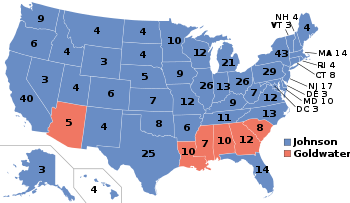
1964 electoral map
Re-elected, LBJ passes the Voting Rights Act of 1965, also with bipartisan support. LBJ addresses a joint session of Congress, in a speech that still makes me misty-eyed:
It is not just Negroes, but really it is all of us, who must overcome the crippling legacy of bigotry and injustice. And we shall overcome.
Thurmond the Dixiecrat-turned-Republican is the only Republican senator who votes No. Republicans field a candidate for governor in South Carolina in 1966 for the first time since Reconstruction. He loses 58%-42%, but erosion of support for the national Democratic Party is reaching the state level.
Goldwater’s landslide loss hardly establishes a new normal for Republicans, who still flirt with Rockefeller and Romney before settling on Nixon, whose civil-rights position is fuzzy. While few Dixiecrats are ready to follow Thurmond into the new tribe of Southern Republicans, they also can’t vote for the hated Hubert Humphrey. So in 1968 they give the regional-party thing another try with George Wallace.
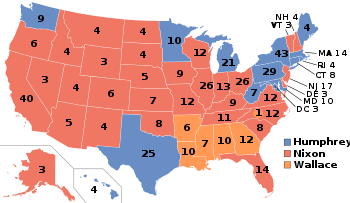
1968 electoral map
But Nixon understands that Republicans have to pick up what the Democrats have dropped. His “Southern Strategy” (with Thurmond’s endorsement) captures the upper South in 1968, which is his victory margin in a close election. His long-term vision is for Republicans to absorb the Wallace vote into an unbeatable conservative coalition that Nixon strategist Kevin Phillips calls The Emerging Republican Majority.
 Phillips writes:
Phillips writes:
The more Negroes who register as Democrats in the South, the sooner the Negrophobe whites will quit the Democrats and become Republicans. That’s where the votes are. Without that prodding from the blacks, the whites will backslide into their old comfortable arrangement with the local Democrats.
The Nixon re-election landslide of 1972 sweeps the South, but it’s hard to read much into that, since he takes every state but Massachusetts, and Georgia’s Jimmy Carter manages to pull the Democratic South together one last time in 1976.
But 1980 is the re-alignment election that has been brewing since 1964.
Ronald Reagan’s first speech as the Republican nominee is in the symbolic location of Neshoba County, Mississippi, site of the Mississippi Burning murders of 1964. So: symbolic time, symbolic place — what’s he say? Nothing about race at all. Just this:
I believe in state’s rights; I believe in people doing as much as they can for themselves at the community level and at the private level. And I believe that we’ve distorted the balance of our government today by giving powers that were never intended in the constitution to that federal establishment. And if I do get the job I’m looking for, I’m going to devote myself to trying to reorder those priorities and to restore to the states and local communities those functions which properly belong there.
States rights, local control — just what Orval Faubus and Ross Barnett and George Wallace wanted when they refused to enforce federal court orders to integrate their schools. Just what Eisenhower and Kennedy didn’t allow when they sent federal troops.
It’s the beginning of the dog-whistle era. After the election, Reagan strategist Lee Atwater lays it out:
You start out in 1954 by saying, “Nigger, nigger, nigger.” By 1968 you can’t say “nigger”—that hurts you, backfires. So you say stuff like, uh, “forced busing”, “states’ rights”, and all that stuff, and you’re getting so abstract. Now, you’re talking about cutting taxes, and all these things you’re talking about are totally economic things and a byproduct of them is, blacks get hurt worse than whites.… “We want to cut this,” is much more abstract than even the busing thing, uh, and a hell of a lot more abstract than “Nigger, nigger.”
So Reagan isn’t trying to “out-nigger” anybody, because people up North will hear him and think he’s evil. He’ll just say “states rights” — like Strom Thurmond and Jefferson Davis before him — and hope “Negrophobe whites” get the message that they are welcome in his coalition.
They get the message.
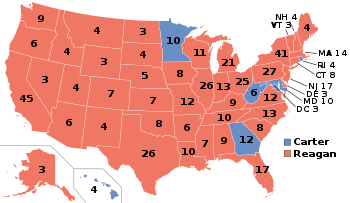
1980 electoral map
They get it not just nationally, but on the state level. Alabama and Georgia elect Republican senators for the first time since Reconstruction.
In case anybody has forgotten that message by 1988, George H. W. Bush reminds them: If you vote for Democrats, Willie Horton will rape your wife.
 Locally, the transition from the “old comfortable arrangement” is gradual. Most Dixiecrat/Democrat politicians don’t follow Strom Thurmond’s path to the Republican Party, though during the 70s and 80s they often combine with Republicans in Congress to form the conservative majority Phillips predicted. But as they retire, they are replaced by Republicans like Trent Lott and Newt Gingrich. (Lott, interestingly, was endorsed for Congress by his retiring Democratic predecessor.)
Locally, the transition from the “old comfortable arrangement” is gradual. Most Dixiecrat/Democrat politicians don’t follow Strom Thurmond’s path to the Republican Party, though during the 70s and 80s they often combine with Republicans in Congress to form the conservative majority Phillips predicted. But as they retire, they are replaced by Republicans like Trent Lott and Newt Gingrich. (Lott, interestingly, was endorsed for Congress by his retiring Democratic predecessor.)
The chart on the right shows a generational turnover, not a walk-out. Southern Democrats in Congress today tend to be blacks representing majority-black districts, like South Carolina’s Jim Clyburn.
Today, the old white Confederacy is solidly Republican. Nationally, Romney had a clear majority of white voters: 59%. But in Mississippi, a whopping 89% of whites voted for Romney.
How did he lock up the Mississippi white vote? Not by saying “nigger, nigger”. Republicans never did that, because they didn’t exist in Mississippi when that was a winning strategy. Instead, they are the party of traditional values in a state where “tradition” means the stars-and-bars and Colonel Reb. They are the party of property rights and business in a state where property and business overwhelmingly belong to whites. They are the party of small government in a state where only massive federal intervention gave blacks the right to vote or to attend the state university.

Republicans don’t have to say “nigger, nigger”. Everybody gets it. They aren’t the Racist Party, but they are the party where white racists are welcome, where “Barack the Magic Negro” is funny, and people email each other photos of Obama with a bone through his nose or put his image on fantasy food stamps with ribs and watermelon. Just as Republicans aren’t anti-Hispanic, they just think police should stop people who look like they might be illegal immigrants. They aren’t even anti-Muslim, they just don’t think freedom of religion includes the right to build a mosque.
That’s the Party of Lincoln today. And now you know how they got here.
*A longstanding argument claims that secession was about “state’s rights” and not about slavery. Mostly you’ll hear this from people who have affection for the Confederacy but find slavery embarrassing. Actual Confederates did not suffer this embarrassment, and were very open about why they were seceding. South Carolina’s declaration of secession is clear:
A geographical line has been drawn across the Union, and all the States north of that line have united in the election of a man to the high office of President of the United States, whose opinions and purposes are hostile to slavery. … On the 4th day of March next, this party will take possession of the Government. It has announced that the South shall be excluded from the common territory, that the judicial tribunals shall be made sectional, and that a war must be waged against slavery until it shall cease throughout the United States.
We, therefore, the People of South Carolina, by our delegates in Convention assembled, appealing to the Supreme Judge of the world for the rectitude of our intentions, have solemnly declared that the Union heretofore existing between this State and the other States of North America, is dissolved.
** When this recording came up in a different context a few months ago, I gave Thurmond the benefit of the doubt, that he might have said “negro” very fast and slurred. You can listen and judge for yourself.
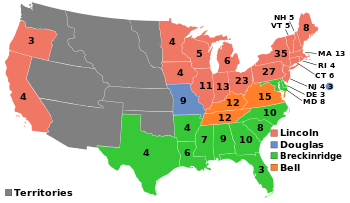




















 In Self’s sequel, the Lion hosts the Kingdom Ball, to which mice are never invited, because they disgust many of the larger animals. Nothing personal, the Lion explains to his friend, it’s just the way things are.
In Self’s sequel, the Lion hosts the Kingdom Ball, to which mice are never invited, because they disgust many of the larger animals. Nothing personal, the Lion explains to his friend, it’s just the way things are.


Recent Comments